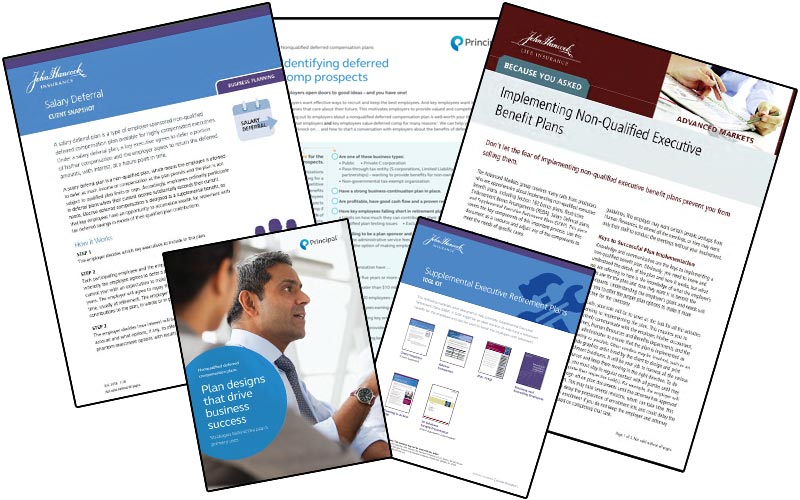
Let’s talk about nonqualified executive benefit plans. It’s all part of our June focus on helping business owners protect, grow, and pass on what they've worked so hard to build.
Nonqualified executive benefit plans are a great tool to help employers attract, reward, and retain executives and key employees. First, we’ll go over what’s in the kit. Next, we'll go over the basics for one specific type of nonqualified plan (deferred compensation) below.
Our FREE 47-page kit includes:

- 2-page intro to nonqualified deferred compensation plans
- 2-page prospecting guide
- 4-page client snapshot
- 2-page guide to nonqualified benefit plan features
- 3-page guide on implementing nonqualified executive benefit plans
- 3 pages of John Hancock toolkits, with links to more materials for executive bonus plans, supplemental executive retirement plans (SERP), and restricted endorsement bonus arrangements (REBA)
- 8-page guide for employers on nonqualified deferred comp plans
- 12-page guide/worksheet for employers on nonqualified deferred comp plans
- 9-page consumer guide to deferred comp plans, with fillable blanks for your agency contact info
Most of the pieces in this kit cover deferred compensation plans, so let’s go over what this concept is, who can use it, and how it works. Keep in mind that deferred comp agreements are just one type of nonqualified executive benefit plans. Others include:
- Section 162 bonus plans
- Restrictive endorsement bonus arrangements (REBA)
- Supplemental executive retirement plans (SERP)
As always, if you need more information on any of these topics, we’re happy to help! Give us a call at 800-823-4852 and ask to speak to a brokerage manager.
Nonqualified Deferred Comp Plans: An Introduction
A nonqualified deferred compensation plan lets an employer provide retirement income (and often death and disability benefits) to one or more employees, often with more benefits than they’d get under a qualified plan. However, these are supplemental benefit packages. In other words, they don't replace traditional qualified retirement plans or group health and insurance coverage.
To create a plan, the employer and employee sign a contract. That contract specifies how much (if any) of the employee's compensation will be deferred now, and what future compensation is to be provided later. A true deferral arrangement asks the employee to defer a pre-tax portion of their current salary, raise, or bonus in return for future benefits. However, in many cases, a “salary continuation” arrangement keeps the employee at full salary as a further incentive to stay with the company.
Employers and employees sign a contract that specifies how much (if any) of their compensation will be deferred now, and what future compensation is to be provided later.
The plan benefits usually start when the employee retires. They continue for the period stated in the contract, either for life or a fixed period of time (20 years, for example). If the employee dies while receiving benefits, they can transfer to a beneficiary.
Why Employers Might Offer a Deferred Comp Plan
These agreements let business owners offer extra benefits to one or more high-value employees. In most cases, employers offer them to executives and key employees, incentivizing their work and encouraging them to stay with the company. Employers set the terms of each agreement at their discretion. This means different employees can have different benefits, without exposing the employer to claims of discrimination.
Employers set the terms of each agreement at their discretion. This means different employees can have different benefits, without exposing the employer to claims of discrimination.
From the employer's perspective, deferred comp plans offer benefits qualified plans can’t. For example, qualified plans are subject to strict regulations, benefit caps, and contribution caps. They also come with high administrative costs. Employers who want to add even more benefits for key employees can do so without adding extra administrative cost to their bottom line. If executed correctly, a nonqualified benefits contract is exempt from nearly all ERISA regulatory requirements and doesn't require IRS approval.
Another benefit to employers is the ease of financing the plan. Usually, they do this by taking out a life insurance policy on the employee. This works well because, for maximum tax deferral, the plan must be unfunded. That means the employer can't currently have cash set aside to pay the plan's future benefits. Or, if they do, those funds must still be considered a general business asset and available to creditors. If those funds existed and were set aside in a dedicated trust, for example, that would be classified as a “funded” arrangement and create income tax liability for the employee.
Why Employees Might Want a Deferred Comp Plan
Deferred comp plans can also really help highly compensated employees. Traditional qualified plans limit their contributions—and as a result, the percentage of their income that qualifies for tax deferral. A supplemental retirement plan in the form of a deferred comp agreement helps them reduce their taxable income now (if it's a "true deferral") and offers supplemental benefits later, during their golden years.
Also, because employers can write the terms of a plan for each individual employee, there's a lot more flexibility involved. Unlike qualified plans, employees can have a say in when their deferred comp plan starts to pay out. This means they can also control the taxation that comes along with that payout.
Prospecting Tips
So who should you approach about the benefits of implementing a deferred comp plan? In short, look for these four types of clients:
- An employer looking to retain and incentivize valuable, well-compensated employees.
- A key employee who’s already contributing the maximum amount to an employer-sponsored defined benefit plan.
- An employer looking to create a competitive benefits package prior to hiring a new executive or key employee.
- An employer who doesn’t want to offer a qualified retirement plan, but still wants to offer a benefit plan to some or all employees.
In addition, you want to approach business owners with a proven track record. They need the cash on hand to begin paying into the life insurance policies for the employees they select. If you've already helped a business owner with succession planning, this is a good reason to check back in with them and see if deferred comp plans might help them retain key employees.
Download our Nonqualified Executive Benefit Plans Sales Kit Now!

Have questions? We’re happy to help! Call us at 800-823-4852 and ask to speak to a brokerage manager, or drop them into the comments below.
